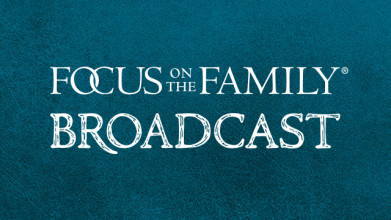Preview:
Gary Thomas: There’s love, generosity, patience, thankfulness. Every virtue, I believe, brings so much joy and empties out so much frustration.
End of Preview
John Fuller: Well, that’s Gary Thomas, and he’s our guest today on Focus on the Family, here to share powerful truths about God’s purpose for you. Thanks for joining us. Your host is Focus president and author Jim Daly, and I’m John Fuller.
Jim Daly: Hey, John, I came to know Christ as a teenager. It was a process. I think I really, uh, dug in spiritually at about 22, 23, is where I kind of lined my heart up with my head and pulled it together, if I could say it that way. But I can remember the excitement that came with being a new believer, wanting to live differently, you know, saying no to things in high school that I easily would’ve said yes to before. But, after you’ve walked with God for a while, it’s easy to turn on autopilot. I don’t know where that might be for most people, 10 years, 20 years, 30 years, maybe never, and God bless you. That’s awesome if you’ve been able to live that, uh, path bright and burning right from the get-go. It’s typically not the human experience. And maybe you find yourself struggling with that same sin that comes back again and again and you’re feeling defeated, or you feel disconnected from God, uh, for whatever reason and, today, we want to encourage you, uh, to stick with us so that we can talk with our guest about what the scripture says as we draw near to God.
John: Mm-hmm. Yeah. And, as I mentioned, Gary Thomas is with us. He’s a popular broadcast guest here, been here a number of times discussing marriage and parenting and spiritual formation. Uh, Gary is an international speaker and bestselling author and, uh, the concepts we’re talking about today are covered in his book, The Glorious Pursuit: Becoming Who God Created Us to Be. And we’ve got copies of that here. Just stop by focusonthefamily.com/broadcast or call 800, the letter A, and the word FAMILY.
Jim: Gary, welcome back to Focus.
Gary: Thank you, guys. It’s always great to be back here.
Jim: It’s good to have you. Um, let me start, um, the conversation this way, uh, that idea of holiness and tipping in toward holiness, righteousness, I mean, some churches today, we’re not even preaching about it any longer.
Gary: I know, I know.
Jim: Um, why isn’t this something that we long for, that we thirst for, more than we are?
Gary: Uh, this is where I, I’ll be honest, I just feel like I’m swimming a little upstream when I talk about practicing the virtues, when I talk about practicing holiness. We seem very wary of legalism, and we should. We are saved by the finished work of Jesus Christ, not by our own righteousness. All of our holiness depends ultimately on Christ’s righteousness, but because of that, we tend to ignore the many scriptures that call us to grow in righteousness. It’s our spouses and our kids that bear the greatest burden of our lack of sanctification, our anger, our pride, our selfishness, our impatience, a lack of gentleness. They pay the greatest cost, so it’s one of the greatest gifts we can give to our families. I think it’s one of the greatest gifts a pastor can give, uh, to his church. I think it is a trap to work on your sermons and not work on your character.
Jim: Wow. That’s true for all of us, you don’t have to be in a pastoral role, but you’re right.
Gary: Well, it is. Well, certainly, Jim, with, with, well, you, you got … but it’s, it’s a challenge.
Jim: Yeah, and it’s well said, but, uh, you know, practicing the virtues isn’t something we do to earn our salvation, you mentioned that, but why, as human beings, do we tend to lean in that direction? When we practice the virtues, we begin to think, “Eh, I’m a lot better than that guy.” I mean, it is so oddly human to do that-
Gary: I know.
Jim: … but why?
Gary: I know.
Jim: We’re not earning our way in.
Gary: Yeah.
Jim: We’re trying to reveal the character of Christ in our good virtue.
Gary: I think because we compare ourselves left and right and instead of up.
John: Mm-hmm. Yeah.
Gary: I mean, James is a classic case, James 3:2. James grew up as the brother of Jesus Christ. Roman Catholics would say grew up as the cousin of Jesus Christ. The key is that they grew up together as young boys, and he’s the one who said, “We all stumble in many ways,” and the early church knew what he was talking about. That was his status because he grew up around Jesus and he could say, “Look, trust me, I’ve been around literally the only perfect man who ever lived. I’ve seen virtue perfected in his tone, in his actions,” and says that “and, and if you, like me, had one that, you would know that the best of us, on our best day, will stumble in many ways.” And I think the reason Peter talks about it, and, and Paul talks about it, they had lived around Jesus. They knew what was possible. We try to find the worst husband in the church (laughs) or wife, try to find the worst wife in the church, and hope they stay because, if we’re compared to them, we feel okay, but that’s not who Paul, Jesus, or Peter call us to model ourselves after.
Jim: Uh, you know, many Christians, we believe growth happens when you let go and let God. That’s a common phrase in church. Some people may not even understand what does that even mean, to let go and let God. So what role do we play, uh, in our own spiritual development?
Gary: I think scripture calls us to a very active role. 2 Peter 1 says, “Make every effort,” think about those words, “every effort to add to your faith,” and then he goes on and lists a number of the virtues.” That’s 2 Peter 1, uh, verse five. Now, if I was just saying that people would say, “Heresy,” until you say, “Well, this is actually … I’m quoting Peter.” And then he explains why. He says, “If you possess these qualities in increasing measure,” so we don’t corner the market on them, we should be making every effort to add so that they’re increasing measure, they will keep you from being ineffective and unproductive in your knowledge of our Lord Jesus Christ, “but whoever does not have them is nearsighted and blind, forgetting that they have been cleansed from their past sins.” So Peter would say the act of salvation reminds us of the need to grow, it doesn’t remove us from the need to grow.
Jim: Yeah, and that is so good. I remember talking to a Christian leader and, uh, we were talking about the fruit of the spirit, and he said, you know, “I just, I don’t have much patience,” and I remember thinking, I may have said it, “I don’t think it’s like a menu you order from, (laughing) you know, ‘Give me a dose of love. Ooh, I got lots of love for people, but I don’t have much patience for people though.'” It is that idea of increasing in those things, even where you have a deficit in your own temperament and personality. Speak to that for a minute. How, if you are that guy, you know … let’s not make fun of him. I, I could answer with a different word, but I have a deficit in one of the virtues of the fruits of the spirit, love, joy, peace, goodness, kindness, mercy, self-control. What should I do if I don’t have something to the adequate level that I think I should have it?
Gary: It goes to the whole model of what the ancients called practicing the virtues. I believe the ancients looked at the virtues like modern bodybuilders look at weights, you do certain exercises to build your biceps, your shoulders, your legs. Obviously, I’m speaking theoretically here (laughing). I don’t have great knowledge of that-
Jim: Thank goodness for radio (laughing).
Gary: … but, but I hear. Uh, uh, uh, (laughing) um, but the key is that you could look at the virtues of Christ, how he acted … that’s where I think this is very, a very Christian thing. It’s not the virtues is, uh, apart from anything, but we want to become like Christ, and you practice them. Jesus was gentle. He says in Matthew 11:29, “I’m gentle and humble in heart.” So how do I begin to practice gentle? Jesus was courageous, Jesus was patient, and so you look at the things that Jesus and did and say, “I, I want to practice that.” And I believe it’s inside out, but also outside in. It needs to begin with inside out. We need the Holy Spirit to make it possible for us to change, but, once the Holy Spirit redeems us and empowers us to do that, the more we act in a humble way, the more humble we become. That’s just with neuroplasticity. The way that you, uh, become a better golfer or a better flute player or, uh, do anything, you, you know, your brain is shaped by your actions.
Jim: Yeah, that is so good. We, we’ve touched on this idea of virtues. You talked about humility, and we’ll certainly, uh, explore that a bit more, but what are those specific virtues?
Gary: Uh, yeah, well, I, I think humility, it’s been called the queen of the virtues, for good reasons. All of the classics just stress how key humility is.
Jim: Yeah, that’s the baseline.
Gary: And when I think about it, the, the, the, I can’t think of a sin I could commit without humility. You can’t steal from somebody if you have humility ’cause you would rather go without than deprive someone else. You can’t gossip. You’re not going to exalt yourself over someone. You can’t oppress someone. You would want to serve them instead of take advantage of them. So, uh, really, humility is the key. If you get humility down, there’s going to be a lot more, (laughs) but the other ones that often we don’t think of as virtues, but they really give so much joy to life … a big one you see, in Jesus’ life, was surrender. Jesus said in John 6:38, “I have come down from heaven not to do my own will, but the will of Him who sent me.” That defined Jesus. And what brings more vexation and frustration in our life than things don’t go the way we want them to go. And Jesus had this amazingly peaceful … things would just happen. He didn’t sketch out his day. He didn’t have handlers giving him 15-minute blocks, (laughing) “I’m going to do an exorcism here, a teaching there, cast out a demon.” It was really spontane- … He surrendered to what God brought up. So I found surrender is very hard for me, (laughs) but I very joy-filled one. Detachment is a great one. Of course, there’s love, generosity, patience, thankfulness. Every virtue, I believe, brings so much joy and empties out so much frustration. They’re so much more valuable than we realize. We just chase after things that don’t matter, that we can’t hold on to, uh, but the virtues are really, I think, where life fulfillment is found.
Jim: That is so good, and I, you know, again, you sit there, and you take a quick, uh, evaluation of where you’re at, right? Uh, that one, I think I understand. This one, eh, I may be a little light in. Uh, we’ve all been there. I believe your wife … I think, in the book, you talk about your wife complimenting your attitude once and then (laughs) that went to your head (laughing).
Gary: Yes. (laughs) …
Jim: That’s so funny. And I appreciate that vulnerability ’cause that’s what, that’s certainly what I would do, “Yeah, thank you very much.”
John: We’ve all been there.
Gary: Well, the, the, the classics warn about it because, if you aren’t rooted in humility, i.e. the only righteousness that matters is Christ’s righteousness, then, when you start to see a victory, it makes you proud, which they say (laughs) is the worst sin, and so you’re back at the bottom. Uh, and so it’s recognizing that, again, this isn’t about obtaining favor before God or special credit with God that He’s going to owe us if we do this. It’s really just a call to a better life. Uh, one time, after I did a podcast here, my wife, uh, she’s great at planning things, and she said, “Gary, you need to take some time off,” so we went to … is it Glenwood Springs-
John: Mm-hmm.
Jim: Yeah.
Gary: … where they have Iron Mountain Hot Springs?
Jim: Yeah.
Gary: Have you ever been there? They have all of these pools.
Jim: Yeah. Oh, yeah.
Gary: And, and we were there, we were going through the pools, it was really relaxing, and I think it was a bachelorette party that came in ’cause there were probably (laughing)-
John: Ooh.
Gary: … 10 or 12 young women, to me, I’d say late twenties, early thirties, and as they were going from pool to pool, they came into our pool, and they just started talking about how much time, effort, and energy they spent trying to look young. Now they already looked young (laughing) to me, right, but they … I mean, just they were giving doctors’ addresses (laughing). They were talking about, “Oh, this costs that much.” One of them said, “Well, this is, this is what all the Kardashians are doing now.” I mean, it was just a world I didn’t know existed and, after a while, Lisa said, “Gary, do you mind if we go to another pool?”
Jim: Yeah.
Gary: I said, “No, that’s great.” And, and Lisa asked me, “Does it bother you that I’m not so into that?” And I’d just been reading William Law at the time. He was an 18th century Anglican, uh, really stresses the virtues, and what he said was this, “Women and men should earnestly pursue humility, patience, generosity, faith, compassion, courage, kindness, and forgiveness,” this is the key, “with the same intensity that those in the world pursue wealth, fame, worldly achievements, and physical beauty.” We’re all pursuing something. Those women are pursuing trying to stay looking young. They’re going to fail, all right (laughs)? Eventually, they’re going to fail. We, we all pursue money. You’ll fail because, on the day you die, you don’t get to keep any of with you. We, we all pursue all of these things, and the classics, and I believe scripture and Peter and Paul and William Law said, “You know what? Why don’t you pursue humility? Why don’t you pursue patience and generosity and find a fulfillment that grows?” Because you mentioned the fruit of the spirit, Jim, the fruit of the spirit grows. You know, the bank account, you can have a million dollars in stocks and have a bad day, suddenly, you have $750,000 in stocks. You can’t guarantee that. But, when the spirit makes the fruit grow, uh, you’re making a deposit that will get better and better as the years go by, not worse and worse. Most of the things we are obsessed with achieving in this world die, they decline. Um, scripture and the classics call us to something that can grow, that, in fact, will be a mirror of what we’ll have in eternity because that’s when the virtues are fully unleashed. When we see Him, we’ll be like Him-?
Jim: Mm-hmm.
Gary: … for we’ll see Him as he is.
John: Yeah, we’re talking about eternal values and, uh, this is a great conversation with Gary Thomas on Focus on the Family. Pick up a copy of his book, The Glorious Pursuit: Becoming Who God Created Us to Be. We’ve got copies of that here. Call 800, the letter A, and the word FAMILY, 800-232-6459, or stop by focusonthefamily.com/broadcast.
Jim: Gary, I think one of the things that’s so difficult in this life is our sin nature.
Gary: Yeah.
Jim: I mean, it just keeps us pulling us away from those very things that we want to do. It’s like what Paul said, right, “Those things I want to do, I don’t do, and the things I don’t want to do, I do,” and, boy, can we relate to that in this walk of life? And, in that regard, um, you know, again, how, how do we stay focused, how do we stay kind of, you know, with the right thing in front of us that drives our marriages to a better place, that drives our parenting to a better place? How do you, when you have a bad day, how do you recalibrate, how do you say, “Okay, Lord, that was, uh, a whiff (laughing). I missed there,” um, now what do you do? How do you regain that equilibrium to say, “I can get back on the right track?”
Gary: Yeah. It, that’s what I love about this ancient practice of practicing the virtues. Instead of focusing on not doing something bad, which is the trap that religious people fall into, it’s focusing on what we’re to become. And I just think positive growth is a more joy-filled growth, and it’s the glorious thing about being a Christian that Christ forgives us.
Jim: Amazing.
Gary: Your righteousness doesn’t depend on how long it’s been since you committed your last worst sin. You know, I, I get the whole thing about addiction, and you have your sobriety days and whatnot and, and I’m not knocking that at all, I’m actually a fan of 12-step groups, but our righteousness depends on what happened over 2,000 years ago on Calvary-
Jim: Mm-hmm.
Gary: … not what we did last week or last year or how many decades even it’s been. And so, for the virtues, what it did is it released me from focusing on, “I don’t want to do this, I don’t want to do that,” to “This is what I want to become,” and, and I think it’s a call to the church. The, the church is so concerned, I think, about getting people into church and I think what if we had just as big a vision for what kind of people come out of church?
Jim: Yeah.
Gary: If people coming out of church were people of gentleness and humility and surrender and patience, I think more people would want to get into (laughs) it, but our focus is really we’re just going to get the bodies there without thinking, “But are the souls being transformed while they’re there and they leave as different people?” I, I think that will be the biggest draw for the church going forward.
John: Mm-hmm.
Jim: It’d be very appetizing for the world to see people behaving like that, I think. Even that idea of surrender, let’s move now-
Gary: Yeah.
Jim: … to surrender, away from, uh, humility, which, again, is the kind of the bedrock for it all.
Gary: Yes.
Jim: But surrender, even, uh, you know, Gary, I played football. I don’t like to surrender. I’m in the battle. I love King David. I’m going to win for the Lord. I’m going to go do what I have to do and battle my way into this and make sure the Lord is victorious, that we win by at least three touchdowns (laughing). I mean, that is kind of the mantra today.
Gary: I know, I know, and the challenge is isn’t the failure to surrender that brings so much anxiety and raises our blood pressure and so much frustration and impatience with our family? I noticed, uh, something one time with just commuting to work. If you’re trying to change lanes, every couple of minutes and you get … and, and it just never really helps.
Jim: Don’t surrender that space (laughing). Close the gap. Don’t let that person in (laughing). Gary, come on.
Gary: But, if I go back and I’m saying, “Okay, I can’t change this. God, who can I pray for? Uh, can I … I know this sounds hokey, but is there a worship song I can sing? Is there just something I can just sit and listen? Is there someone I can call?” I, I just found surrender is very difficult for me to do, but one of the most beneficial things for me when I actually do it. I think it’s so crucial because it’s rooted with humility. You can’t have humility without surrender. Surrender recognizes God is sovereign, He lets things happen, He’s going to organize things, we don’t have to make everything happen, I think, especially with our kids. Sometimes with our adult kids, we have to say, “Lord, I’m, I’m putting them into your hands,” uh, and that’s where we can recognize we don’t rule the universe, as much as we would like to. But, boy, I think surrender preserves contentment.
Jim: Right, you know, and sometimes surrender shows itself in circumstance, mostly, right? You had a story in the book about, I think, you and Lisa wanted to move-
Gary: Oh, yeah.
Jim: … and (laughs) then you realized, when you were thinking of putting your house up, that it was going to sell for less than you bought it for, probably not a good time to move.
Gary: Yeah, it was, it was in Northern Virginia (laughing) at a terrible time to sell. We wanted to get back so that our kids could be with our grandparents, uh, you know, a noble aim.
Jim: Mm-hmm.
Gary: We want them to know that we thought it would be a better community, and we talked to a realtor, and he said, “Yeah, we could sell this house. It’ll probably only cost you $10,000 (laughs).” I’m thinking, “Aren’t you supposed to make money on your house,” and (laughs) uh, it just wasn’t there. And then, uh, Lisa went to a Bible study, and a lot of people were trying to move, it was an area where a lot of people move out of in Northern Virginia, and she said that a great offer came through, they were surprised, they were going to get to move, and Lisa just … she’s like, “Well, God, when’s our miracle going to come through?” ’cause we just couldn’t make it happen until she was praying one time and really felt the Lord saying, “Has it ever occurred to you I wanted you to buy that house?” ’cause we had prayed before we bought it. I mean, I had asked God, “Are you sure this is where we should go?” I’d sought counsel. Everything said buy the house and, uh, God challenged Lisa with these words, “Has it ever occurred to I wanted you to move into that neighborhood for reasons other than financial gain?” And we thought of the churches we had been involved in, we thought of the neighbors we had touched, the friends we had made, and we had to say, “Yeah, God could lead us to make a decision that would cost us financially, but would be prosperous spiritually,” and that’s when we were able to let it go, uh, because it was going to happen regardless and-
Jim: Oh, I know.
Gary: … and that’s the kind of thing where we just have to say, we forget, “Uh, God, are you going to come through for us?” And we got to say, “Well, maybe I have a more important work here.” You can’t read the New Testament without believing that God wouldn’t ask people to make financial sacrifices (laughs) for the sake of His kingdom. I mean, Jeremiah bought a field that he knew would never come back. He had prophesied that it was going to be taken away, but he buys it because he says, “That’s going to be a picture of God bringing the remnant back, and so I’m buying this field.” He would never own the field, but he’s spending money to make a spiritual statement. Well, I think God can work that way in the 21st century as well.
Jim: Gary, that really is the battle for life. We’re always faced with choices, right, it’s always choices, and the key is do you make the right choice in Christ? That’s what you’re saying. And, you know, for the folks listening or watching via YouTube, uh, we’re here for you, that’s one of the great things, and John will give those details in just a moment. Uh, before he does, Gary, I also want to go back to where we started really. We talked about the long spans that Christians can find themselves in this lull in their relationship with the Lord. You’re doing the right things for the most part. Let’s say you’re living a 95% right life. I’m just, you know, putting a little 5% dent there for sin because Paul says we’re all sinners saved by grace. But, in that context, generally, you don’t see things that you need to work on, your relationships may be going okay, but it feels like you’re just sailing, you know. It’s the wind and I’ll go where I’m going to go. You had that feeling, uh, a few years ago, you had that lull in your relationship with the Lord and I, again, I appreciate your transparency in that ’cause, at some point, we all tend to live in that spot. What arrested your attention? Why did you say, “Okay, something’s got to change here?” What were those elements? And I’m hoping it’ll help many other people that are in that same spot.
Gary: It was actually some years ago, when our kids were really young, and I think the biggest marker was a lack of joy, and here’s what’s happening. We had young kids. I had a long commute. I was in Northern Virginia, so it could be an hour or more with long days. And you know how it is just with duty, and I’d get frustrated with the drivers, I was frustrated with things at work. I was frustrated that my dream of becoming a writer just wasn’t happening. I was just … uh, uh, I felt like I was ramming up against a brick wall every day and not getting any closer. So there was no surrender. There was no patience. That usually undercuts humility, “God, I deserve more than this.” And you know how it is when you’re raising small kids and you’re working, I mean, uh, there’s a lot of giving there (laughing). And, and husband and wife are both trying to give and it, it just … it, and I just noticed this, “Gary, you just, you just have a sour attitude.” It wa-, I, I wasn’t resembling Christ at all, and that’s where humility was sort of the key to bring the joy back. I just go to a brother, “Look, I’m not addressing this. I’m not addressing that. I feel like I could be drifting here. I could, I could be drifting there. I just really need that, you know, people call it the come-to-Jesus moment.” I mean, I was still going to church every week and I still mostly have quiet times, but that sense that just, overall, I wasn’t addressing the positive growth. I was drifting along where my disappointments would take me, where anxieties would take me, where pressure would take me. I wasn’t making every effort to add to my faith, and I realized I had drifted a lot, lot farther than I thought.
Jim: Mm-hmm.
Gary: Um, and so just that one little prayer … and this was a confessional prayer. I think there are sometimes it just really does help to confess, with a brother, what’s going on in your heart. And just being received by God at church that next Sunday, the, the warmth that just fell through me when I just put it up and God said, “I receive you, I accept you, I forgive you.” And, and that’s the glorious thing about being a believer in Jesus Christ, Jim, He always takes us back.
Jim: I believe it.
Gary: He sees what we’re doing.
Jim: Yeah.
Gary: He, He’s just waiting. It’s like we take half a millimeter step toward Him, and He runs 100 miles to bring us back. And so I really hope that people will see this as, “Yeah, maybe I have drifted. You know, I’m, I’m impatient. I’m arrogant. The last thing I do is surrender. I’m harsh. I’m not gentle.” Um, rather than be discouraged, just say, God says, “Today’s a new start.”
Jim: Yeah.
Gary: “I’ve taken care of that.” You can start over. You can know His joy, you can know His acceptance, you can know His love, and His word points out the way on how, step by step, you can get back to that place.
Jim: Yeah. Gary, that’s so good, and I, I really want to turn to the listeners, the viewers, to say, if you’re in that spot where you feel like you’re drifting, don’t stay there. That’s a no man’s land and, believe me, in John 10:10 where the scripture says that the evil one, the thief comes to steal, kill, and destroy, and he’s after you, and I think it’s a killing field when you’re in that spot, for a variety of reasons, and you’re not moving, uh, to deepen your relationship with the Lord and you feel like you’re drifting, and we’re here for you. Uh, one of the things we’d love to do is get you a copy of Gary’s book. If you can make a donation for any amount, we’ll send it as our way of saying thank you. If you can’t afford it, uh, that’s not the exchange here. We’re going to trust others will participate in ministry with us and cover the expense of getting you a copy of that, uh, wonderful book, that great resource, to help you, The Glorious Pursuit: Becoming Who God Created Us to Be. I mean, what a great title, by the way, Gary. And, uh, I want to get that into your hands, so get in touch with us today.
John: And let me just add that we have caring Christian counselors here. The donor community makes those, uh, great men and women possible for you to have a free consultation with. The book is The Glorious Pursuit, as Jim said. Donate as you can. Uh, get in touch with us when you call 800, the letter A, and the word FAMILY, 800-232-6459, or stop by focusonthefamily.com/broadcast. Well, we hope you enjoy your weekend with your family and your church family as well. Join us on Monday. Ann White will share a powerful story of how God redeemed her broken marriage.
Preview:
Ann White: And I just remember breaking down completely and just begging God. I remember being face down on the floor and just saying, “Lord, I have no clue what to do. I don’t know where to go, where to turn, what to do.”
End of Preview




















